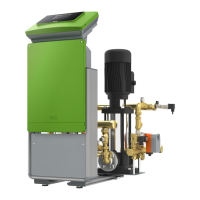Variomat Touch — 09.2020 - Rev. A
• The degassing time can be set in the Customer menu, dependent on the
actual system.
– The default setting is 12 hours. Subsequently, the system
automatically switches to "Interval degassing" mode.
Interval degassing
The interval degassing is stored for continuous operation as default setting in the
Customer menu. Degassing is continuous during an interval. An idling time
follows an interval. You have the option to limit the interval degassing to a
specified time window. You can set the times only in the Service menu.
Start/setting:
• Automatic activation upon expiry of continuous degassing.
• Degassing interval, the default setting is 90 seconds.
• Pause, the default setting is 120 minutes
• Start/End, 8:00 – 18:00 hours.
10.4 Messages
The messages are impermissible deviations from the normal state. They can be
output either via the RS-485 interface or via two floating message contacts.
The controller displays the messages with a help text.
Message causes can be eliminated by the operator or a specialist workshop. If
this is not possible, contact the Reflex Customer Service.
Note!
When the cause for the message is eliminated, you must acknowledge
the fault with "OK" at the controller's operator panel.
Note!
Floating contacts, setting in the Customer menu, see chapter 8.6
"Parametrising the controller in the Customer menu" on page 17 .
To reset a fault message, proceed as follows:
1. Touch the display.
– The current fault messages are displayed.
2. Touch a fault message.
– The system displays the possible causes for the fault.
3. When the fault is eliminated, confirm the fault with "OK".
• Set value not reached.
• Water loss in the system.
• Pump fault.
• Controller in Manual mode
• Check set value in the Customer or Service
menu.
• Check water level.
• Check pump.
• Set the controller to Automatic mode.
• Set value not reached.
• Make-up disabled.
• Air in the system.
• Dirt trap clogged.
• Check set value in the Customer or Service
menu.
• Clean the dirt trap.
• Check functioning of the "PV1" solenoid
valve.
• If necessary, manually add water.
• Set value exceeded.
• Make-up disabled.
• Water intake through a leak in a
thermal transfer medium of the
user.
• "VG" and "VF" tanks too small.
• Check set value in the Customer or Service
menu.
• Check functioning of the "WV1" solenoid
valve.
• Drain water from the "VG" tank.
• Check site heat transfer medium for leaks.
Pump disabled.
• Pump jammed.
• Pump motor defective.
• Pump motor contactor tripped.
• Fuse defective.
• Rotate the pump with screwdriver.
• Replace the pump motor.
• Electrically test the pump motor.
• Replace the fuse.
• Set value exceeded.
• Severe water loss in the system.
• Cap valve at the intake side closed.
• Air in the pump.
• Solenoid valve in the overflow line
does not close.
• Check set value in the Customer or Service
menu.
• Check the water loss and correct, if
necessary.
• Open the cap valve.
• Vent the pump.
• Check functioning of the "PV1" solenoid
valve.
• Set value exceeded.
• Water loss in the system.
• Make-up line not connected.
• Make-up rate insufficient.
• Make-up hysteresis too low.
• Check set value in the Customer or Service
menu.
• Check water level.
• Connect make-up pipe
• Check set value in the Customer or Service
menu.
• Seal any leak in the system.
Controller receives incorrect signal.
• Connect the plug.
• Check functioning of the pressure sensor.
• Check the cable for damage.
• Check the pressure sensor.
